Court rules that Alabama can enforce Vulnerable Child Compassion and Protection Act to ban experimental “sex-modification procedures” on children
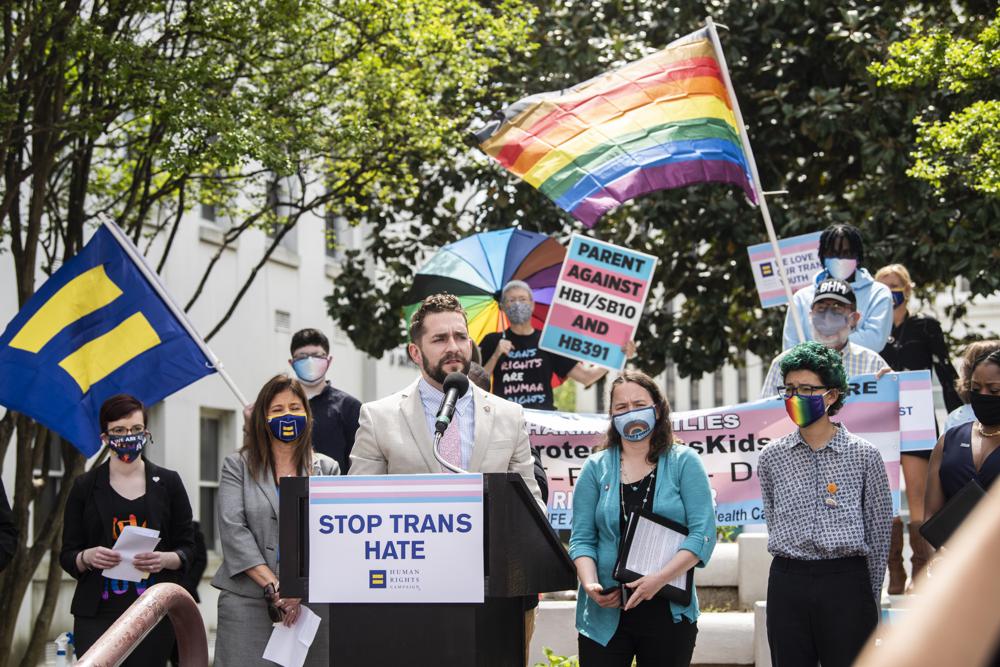
A three-judge panel of the 11th U.S. Circuit Court of Appeals lifted a judge’s temporary injunction against enforcing the law. The judge has scheduled the trial for April 2 on whether to permanently block the law. Alabama’s Attorney General Steve Marshall celebrated the decision saying, “The Eleventh Circuit reinforced that the State has the authority to safeguard the physical and psychological wellbeing of minors, even if the United States Attorney General and radical interest groups disapprove. Alabama takes this responsibility seriously by forbidding doctors from prescribing minors sex-modification procedures that have permanent and often irreversible effects. This is a significant victory for our country, for children, and for common sense.” The ruling follows a string of decisions in recent weeks against similar bans. A federal judge in June struck down a similar law in Arkansas, the first state to enact such a ban. At least 20 states enacted laws restricting or banning hormone treatments and surgery for minors. Bans have also been temporarily blocked by federal judges in Florida, Indiana, and Kentucky. A federal appeals court has allowed Tennessee’s ban, which had been blocked by a federal judge, to take effect. The ruling applies to only the Alabama ban but comes as most of the state bans are being challenged in court. Alabama Gov. Kay Ivey signed the Vulnerable Child Compassion and Protection Act into law in 2022, making it a felony punishable by up to 10 years in prison for doctors to treat people under 19 with puberty blockers or hormones. At the time the Governor said, “There are very real challenges facing our young people, especially with today’s societal pressures and modern culture,” Ivey said Friday in a statement. “I believe very strongly that if the Good Lord made you a boy, you are a boy, and if he made you a girl, you are a girl.” She went on to say, “We should especially protect our children from these radical, life-altering drugs and surgeries when they are at such a vulnerable stage in life” Four families with children ranging in ages 12 to 17 challenged the Alabama law as an unconstitutional violation of equal protection and free speech rights, claiming that the protections were an intrusion into family medical decisions. The U.S. Department of Justice joined their lawsuit, seeking to overturn the law. Major medical groups, including the American Medical Association and the American Academy of Pediatrics, oppose the bans, and experts say treatments are safe if properly administered. Marshall has previously spoke out in support of the ban saying, “On April 8, 2022, Alabama enacted the Vulnerable Child Compassion and Protection Act to protect children from experimental medical interventions that have no proven benefits and carry with them substantial risk of long-term, irreversible harm. “The law reflects a growing international consensus that children suffering from gender dysphoria should not be receiving puberty blockers, cross-sex hormones, and surgeries. Children who take these drugs risk permanent infertility, loss of sexual function, increased risk of heart attack and stroke, bone-density problems, risk of altered brain development, and psycho-social harms from delayed puberty. Conversely, the majority of children who experience dysphoria will have it resolve naturally by adulthood, if not subjected to the interventions above.” U.S. District Judge Liles Burke, who was nominated to the court by President Donald Trump in 2017, ruled when issuing the preliminary injunction that Alabama had produced no credible evidence to show that transitioning medications are “experimental.” Alabama then appealed to the 11th Circuit. Burke allowed two other parts of the law to take effect. One bans gender-affirming surgeries for transgender minors, which doctors had testified are not done on minors in Alabama. The other requires counselors and other school officials to tell parents if a minor discloses that they think they are transgender. Marshall’s office said in a statement, “Attorney General Marshall has been successful in leading this legal battle across the nation, providing support to other states as they defend similar laws to protect children from sterilizing medical interventions pushed by medical interest groups driven by profit and radical ideology. In August, Marshall led a multistate brief in Missouri highlighting the dishonesty of advocacy groups like the World Professional Association for Transgender Health (WPATH). Similarly, in July, General Marshall filed a brief on behalf of 21 states in the Sixth Circuit Court of Appeals supporting Tennessee’s and Kentucky’s laws protecting minors from chemical and surgical sex-modification procedures for kids.” More GOP states are poised to enact similar protections to what critics have called experimental treatment for minors. Democratic governors in Louisiana and North Carolina have vetoed bans, but both are expected to be overridden by Republican-led legislatures. The Associated Press contributed to this report.
“Billboard Chris” brings national conversation on puberty blockers to University of Alabama Birmingham.
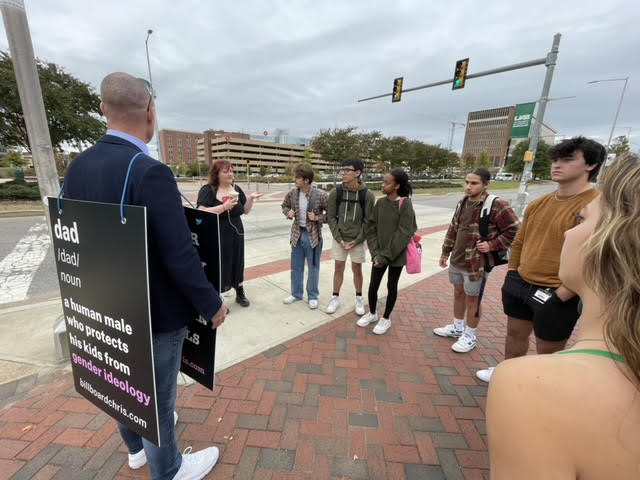
The Vulnerable Child Compassion and Protection Act was signed by Gov. Kay Ivey in April 2022. The law makes it a felony for doctors to prescribe puberty blockers and hormones to children under age 19. Alabama is one of multiple states that have recently pushed or passed laws that protect children and adolescents from the off-label use of prescription drugs that suppress the hormones released during puberty and the drugs that mimic hormones released in the opposite sex during puberty. According to the Kaiser Family Foundation, “Four states (Alabama, Arkansas, Texas, and Arizona) have recently enacted such restrictions (though the AL, AR, and TX laws all have been temporarily blocked by court rulings) and in 2022, 15 states are considering 25 similar pieces of legislation.” “There are very real challenges facing our young people, especially with today’s societal pressures and modern culture,” Ivey said in a statement. “I believe very strongly that if the Good Lord made you a boy, you are a boy, and if he made you a girl, you are a girl.” This is the message that Chris Elston, a Canadian activist known as “Billboard Chris,” brought to Alabama during a recent trip. Elston has traveled across North America wearing signs that spark conversation about the harms of gender ideology and gender transition treatments for children and teens. Elston describes his approach as simple: peacefully and calmly standing where he can be seen and having conversations with passersby. His main message is, “Children cannot consent to puberty blockers.” Elston told Alabama Today, “The puberty blockers being given to children have never had FDA approval for this use, have never had a single clinical study, and, combined with cross-sex hormones, are sterilizing children, about half of whom are on the autism spectrum. Many would just grow up to be gay. All of these children have some comorbidity going on, but the practice today is to simply affirm a child’s self-diagnosis as being gender dysphoric and start them immediately on puberty blockers or cross-sex hormones.” Lupron, the usual puberty blocker, is a cancer drug approved for prostate cancer, endometriosis, and uterine fibroids, and it is the exact same drug used in the past to chemically castrate pedophiles.” This is a point echoed in Alabama’s State House during the passage of the bill, “This is about protecting children because there’s a very high probability that this child will be misdiagnosed and will be entered into an irreversible medical intervention,” said Dr. Patrick Lappert, who spoke during the hearing in February. U.S. District Judge Liles Burke issued a preliminary injunction to stop the state from enforcing the medication ban, which took effect May 8, while a lawsuit goes forward. The ruling was a victory for families and advocacy groups who challenged the first-of-its-kind law as an illegal intrusion into family and medical decisions. Ivey referred to the ruling as a “temporary legal roadblock.” Alabama’s state attorney general indicated he will appeal. Just days after the U.S. Supreme Court ruled that states can prohibit abortion, Alabama seized on the decision to argue that the state should also be able to ban gender-affirming medical treatments for transgender youths. Alabama attorney general’s office argued that gender transition treatments are not “deeply rooted in our history or traditions,” and thus, the state has the authority to ban them. Elston says he hopes they will, “Tens of thousands of children are having their bodies irreversibly harmed. Girls as young as 12 have had their breasts cut off. Boys’ future adult sexual function is being destroyed, and these children will never be able to have families of their own. What child can possibly give informed consent to this?” https://youtu.be/qwdJMQdIc1o
Court hears arguments on Alabama trans youth treatment ban
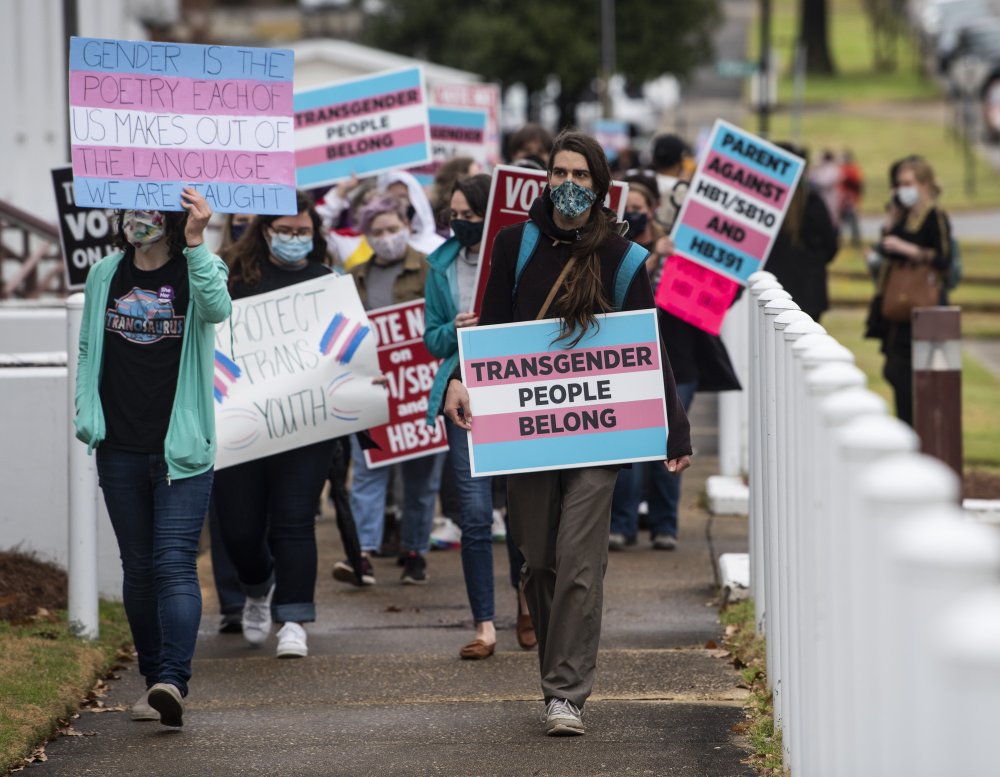
Alabama asked an appellate court Friday to let the state outlaw the use of puberty blockers and hormones to treat transgender children — a move some parents argued violates their right to make decisions about their children’s health care. A three-judge panel of the 11th U.S Circuit Court of Appeals heard arguments in Alabama’s appeal of a preliminary injunction blocking enforcement of the first-of-its-kind law that would make it a felony, punishable by up to 10 years in prison, to give the medications to assist transgender minors in their transition. The arguments in Alabama come three months after the 8th U.S. Circuit Court of Appeals agreed to keep similar Arkansas law on hold. The bans have become a flashpoint as Republican-controlled legislatures advanced bills to not only block medical treatment but also ban transgender children from using school restrooms or playing on sports teams that don’t correspond with their sex at birth. Jeff Doss, an attorney representing five parents and a pediatrician who challenged the law, urged the court to keep the ban on hold. He said the law is discriminatory, and Alabama took the “unprecedented” step of trying to criminalize the accepted standard of care for a medical condition. “If parental freedom means anything, it means that a parent, not the state, should decide whether their child receives life-saving medical intervention, consistent with the standard of care,” Doss said. Doss said after court that “it should be chilling for everyone” that the state is trying to tell parents, “we know best, and we are the ones who are going to make this decision for you parents.” Edmund LaCour, Alabama’s solicitor general, argued that the state has the authority to regulate medical treatments it deems risky. He disputed arguments that the law discriminated against transgender individuals because the drugs are still available to everyone, just not “to affect a cosmetic sex change” “The law does not prohibit any sort of therapy. It doesn’t require that males go by he or that girls wear dresses. All it does is target the risky treatments,” LaCour said. LaCour, at one point, asked judges to imagine if children wanted to use skin grafts, a treatment for severe burns, to change their race. Doing so would just be too risky, he argued. Multiple medical groups, including the American Academy of Pediatrics and the American Medical Association, oppose the ban. The U.S. Justice Department has also opposed the ban as unconstitutional. Fifteen states filed briefs supporting Alabama’s efforts to ban the treatments. The appellate judges did not indicate when they will rule. U.S. Circuit Judge Andrew Brasher, who was Alabama’s solicitor general before he was appointed to a federal judgeship, asked both sides if the law amounted to sex discrimination and if the state had other regulation options, short of an outright ban, if it was concerned about the possible overuse of the medications. Arkansas was the first state to enact such a treatment ban. A federal judge last year blocked the Arkansas law from going into effect, and the appellate court upheld the decision. A trial began last month in the lawsuit seeking to permanently strike down the ban. The Alabama law, dubbed the Vulnerable Child Compassion and Protection Act, went further in putting criminal penalties of people who provide the medications. U.S. District Judge Liles Burke in May issued a preliminary injunction to stop Alabama from enforcing the medication ban. Burke did not block a portion of the law banning sex-altering surgeries for minors, which doctors testified are not performed in Alabama. He also left in place a provision that requires counselors and other school officials to tell parents if a minor discloses that they think they are transgender. Alabama Gov. Kay Ivey at the time called Burke’s ruling blocking the medication ban a “temporary legal roadblock.” The trial in the ongoing litigation is expected next year, attorneys said. Republished with the permission of The Associated Press.
Court sets fall arguments on trans youth treatment ban
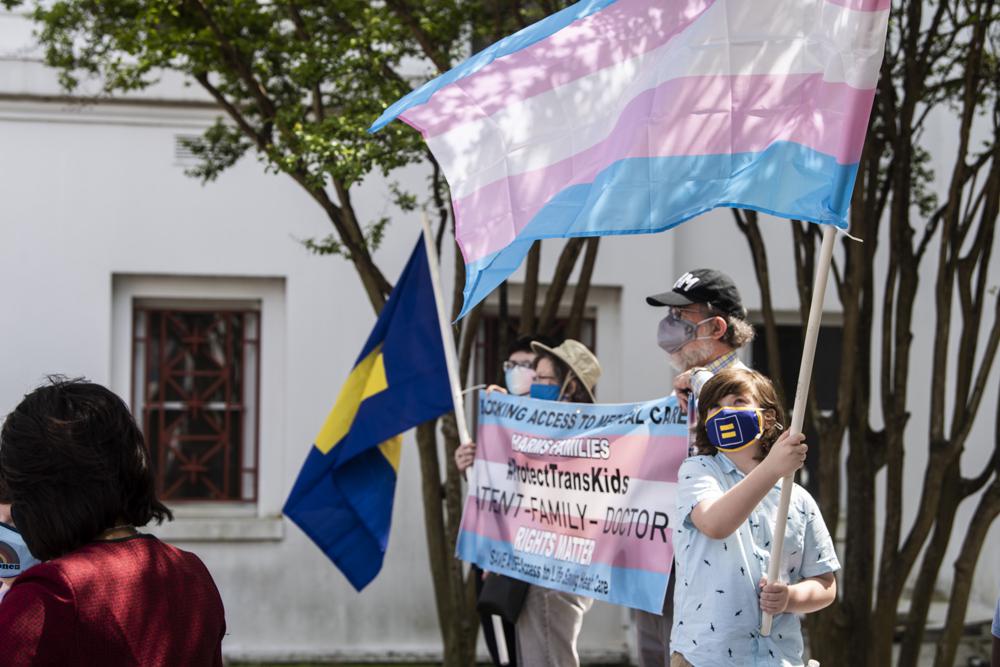
A federal appeals court will hear arguments in November over Alabama’s efforts to outlaw the use of gender-affirming medications to treat transgender minors. Alabama is asking a federal appeals court to lift an injunction and let it enforce a law that would make it a felony to give puberty blockers or hormones to transgender minors to help affirm their gender identity. The 11th U.S. Circuit Court of Appeals has tentatively set arguments for the week of November 14 in Montgomery. In May, U.S. District Judge Liles Burke issued a preliminary injunction to stop the state from enforcing the medication ban while a lawsuit goes forward. Families and advocacy groups challenged the ban as an illegal intrusion into family and medical decisions. Alabama has maintained the ban is needed to protect children. The state has appealed. Alabama Gov. Kay Ivey referred to the injunction as a “temporary legal roadblock.” Alabama’s appeal cites the U.S. Supreme Court’s ruling on abortion, invoking the majority opinion that argues that unenumerated constitutional rights — those not explicitly mentioned in the document — must be “deeply rooted in the Nation’s history and traditions.” A judge blocked a similar law from taking effect in Arkansas. A three-judge panel of the 8th U.S. Circuit Court of Appeals in July heard arguments in that state’s appeal. Republished with the permission of The Associated Press.
Transgender medication law in Alabama blocked by judge
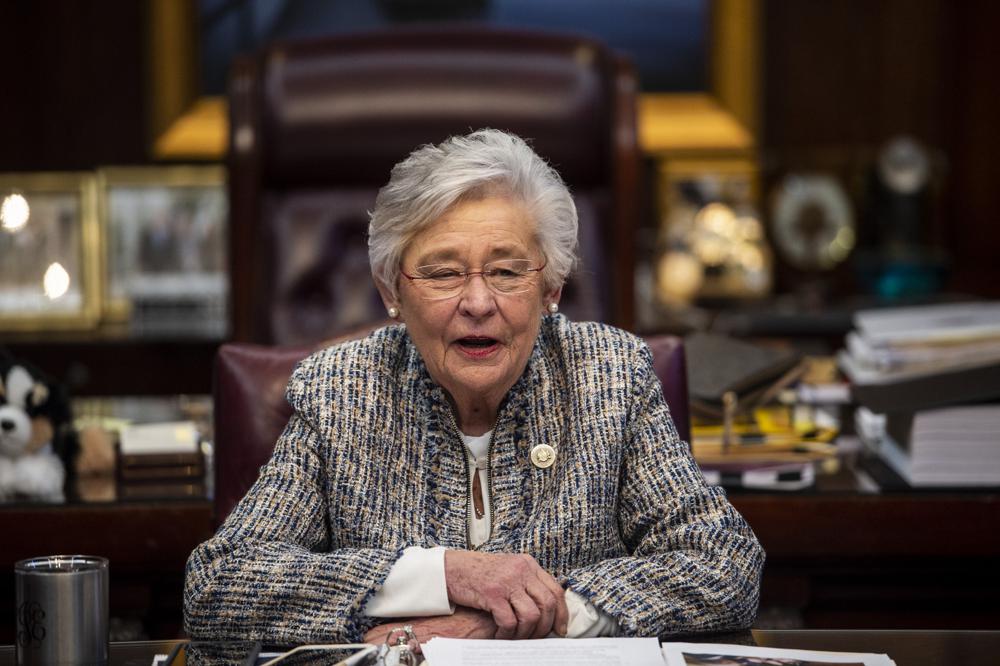
A federal judge on Friday blocked part of an Alabama law that made it a felony to prescribe gender-affirming puberty blockers and hormones to transgender minors. U.S. District Judge Liles Burke issued a preliminary injunction to stop the state from enforcing the medication ban, which took effect May 8, while a lawsuit goes forward. The ruling was a victory for families and advocacy groups who challenged the first-of-its-kind law as an illegal intrusion into family and medical decisions. Alabama Gov. Kay Ivey referred to the ruling as a “temporary legal roadblock.” Alabama’s state attorney general indicated he will appeal. “This ruling means that parents of transgender children in Alabama will continue to be able to make the healthcare decisions that are best for their families. It is an extraordinary relief. Parents should not be punished for wanting to do what’s best for their kids,” said Jennifer Levi, director of the transgender rights project for GLBTQ Legal Advocates & Defenders. The Vulnerable Child Compassion and Protection Act made it a felony, punishable by up to 10 years in prison, to prescribe or administer gender-affirming medication to transgender minors to help affirm their new gender identity. The judge left in place another part of the law that banned gender-affirming surgeries for transgender minors, which doctors had testified are not done on minors in Alabama. He also left in place a provision that requires counselors and other school officials to tell parents if a minor discloses that they think they are transgender. “We will continue fighting to protect Alabama’s children from these radical, unproven, life-altering drugs, despite this temporary legal roadblock,” Ivey said in a statement issued Saturday morning. “It is especially important while they are at such a vulnerable stage in life. We will continue to uphold our duty to ensure that children are free to grow up into the adults God intended them to be, even with today’s societal pressures and modern culture.” A spokesman said Alabama Attorney General Steve Marshall is disappointed in the court’s decision “and is already working on filing an appeal in defense of the law.” Four families with transgender children ranging in ages 12 to 17 had filed a lawsuit challenging the Alabama law as discriminatory, an unconstitutional violation of equal protection and free speech rights, and an intrusion into family medical decisions. The U.S. Department of Justice joined the lawsuit seeking to overturn the law. Burke — nominated to the court by former President Donald Trump in 2017 — ruled that Alabama had produced no credible evidence to show that transitioning medications are “experimental.” He added that “the uncontradicted record evidence is that at least twenty-two major medical associations in the United States endorse transitioning medications as well-established, evidence-based treatments for gender dysphoria in minors.” He noted testimony from a mother who said she feared her child would commit suicide if she lost access to the medications. “Enjoining the Act upholds and reaffirms the ‘enduring American tradition’ that parents — not the states or federal courts — play the primary role in nurturing and caring for their children,” Burke wrote in the opinion. Jeff Walker of Auburn, Alabama, told The Associated Press on Saturday that the ruling “took a lot of weight off our shoulders.” The Walker family is not one of the plaintiffs in the case but said they had been scrambling to figure out how to continue care for their 15-year-old daughter, Harleigh, and if they needed to move to another state. Harleigh Walker said the decision was a “huge stress relief.” The legislation was part of a wave of bills in Republican-controlled states regarding transgender minors but was the first to levy criminal penalties against the doctors who provide the medications. In Arkansas, a judge blocked a similar law before it took effect. Dr. Morissa Ladinsky, a pediatrician who founded a Birmingham medical team that treats children with gender dysphoria, said the decision was a “huge relief for transgender children and their families.” “The court’s decision recognizes that this is well-established care that has been endorsed by 22 major medical associations. This decision will ensure transgender children in Alabama and beyond can continue to receive this evidence-based well-known life-saving care,” she said. More than 20 medical and mental health organizations urged Burke to block the law. Fifteen states filed a brief in the case in support of Alabama’s law. The state attorney general’s office argued that the use of the medications is unsettled science, and thus the state has a role in regulation to protect children. During a court hearing before Burke, state attorneys argued European countries take a more conservative approach to the medications. Alabama lawmakers, who approved the bill this spring, said decisions on the medications should wait until adulthood. Republished with the permission of the Associated Press.
Alabama outlaws gender-affirming medicines for trans kids

It’s now a crime in Alabama to administer or prescribe gender-affirming puberty blockers and hormones to transgender people under age 19, as a new law took effect Sunday without intervention from the courts. Alabama is the first state to enact such a ban on these treatments for transgender youth. A similar measure in Arkansas to halt the treatments was blocked by a federal judge before it took effect. A federal judge has not yet ruled on a preliminary injunction request to block Alabama from enforcing the law while a court challenge goes forward. “Families are scared. How can you not feel like the floor was pulled out from under you?” Dr. Morissa Ladinsky, a pediatrician who founded a Birmingham medical team that treats children with gender dysphoria, said Sunday. Ladinsky said she remains hopeful that a federal judge will grant an injunction request. The Vulnerable Child Compassion and Protection Act makes it a felony, punishable by up to 10 years in prison, to prescribe or administer gender-affirming medication to young people under 19 to help affirm their new gender identity. It also requires school counselors, teachers, and other school officials to tell parents if a minor discloses that they think they are transgender. U.S. District Judge Liles Burke had cautioned attorneys on Friday that he might not have a decision on a request for a preliminary injunction by the Alabama law’s May 8 effective date. Burke said he and his staff would do “nothing else” but work on the issue. Four families with transgender children and others filed a lawsuit that the U.S. Department of Justice joined challenging the law as discriminatory, an unconstitutional violation of equal protection and free speech rights, and an intrusion into family medical decisions. The plaintiffs asked Burke to issue an order blocking enforcement of the statute while the lawsuit goes forward. Twenty-three medical and mental health organizations, including the American Academy of Pediatrics, have also urged the judge to enjoin the law. Attorneys for Alabama argued the ban should be allowed to go forward. Republished with the permission of the Associated Press.
Hearing set in effort to block Alabama transgender law

A federal judge will hear arguments next month on whether to block the enforcement of an Alabama law outlawing the use of gender-affirming medications to treat transgender people under age 19. The May 5 hearing is scheduled just days before the law is set to take effect on May 8. U.S. District Judge Liles Burke set the evidentiary hearing, scheduled to last up to two days, on a request for a temporary restraining order or preliminary injunction to stop Alabama officials from enforcing the law while a court challenge goes forward. The Alabama law will make it a felony, punishable by up to 10 years in prison, for medical providers to give puberty blockers and hormones to transgender people under age 19 to help affirm their gender identity. Four families with transgender children, two doctors, and a member of the clergy filed a lawsuit challenging the law as an unconstitutional violation of equal protection and free speech rights and an intrusion into parental decisions. Republished with the permission of the Associated Press.
Steve Flowers: We now have a very youthful federal judiciary in Alabama

Our senior senator, Richard Shelby, has left an indelible legacy and imprint on our state. Every corner of the state has been the recipient of his prowess at bringing home the bacon to the Heart of Dixie. Every university has enjoyed a largesse of federal dollars. He has made the Huntsville Redstone Arsenal one of the most renowned high technology regions in the nation, not to mention placing the FBI’s second home in Huntsville. Shelby’s accomplishments for Alabama would take a book to enumerate. However, what is not universally known is that Senator Richard Shelby has transformed the federal judiciary in Alabama for years to come. During the entire eight-year presidency of Barack Obama, by nature, we had some attrition in our federal judiciary in all three regions, Northern, Middle, and Southern Districts. Even though President Obama sought to appoint Democratic judges throughout the state, Senator Shelby and Senator Jeff Sessions thwarted all Democratic appointees and held these cherished and powerful judgeships vacant. Shelby and Sessions were hopeful that one day there would be a Republican president coupled with a Republican Senate majority, and they would be able to appoint Republican jurists to the federal bench in Alabama. That happened when Donald Trump became president. Senator Sessions had parted with his senate seat to become attorney general, so that left Senator Shelby to select and get confirmed a host of new, young federal judges in Alabama. Shelby assigned his loyal and brilliant Chief of Staff, Katie Boyd Britt, the job of vetting potential federal judgeships. She and Shelby chose an outstanding cadre of young, well-educated, extremely qualified, moderately conservative men and women to sit on the federal bench in Alabama. This group is stellar and will be the majority of federal judges for the next 25 to 30 years. This coup of appointing young, conservative, extremely capable judges to the federal bench in Alabama may be one of Senator Richard Shelby’s greatest legacies. Shelby had Andrew Brasher first appointed to the Middle District of Alabama. However, soon thereafter, an opening occurred on the Eleventh Circuit, and so Shelby had President Trump appoint Brasher to the higher appeals court. Prior to Brasher’s appointment to the Middle District, he practiced law with Bradley Arant in Birmingham. He was solicitor general and a law clerk for Judge Bill Pryor. Judge Brasher is a graduate of Samford University and Harvard Law School. Senator Shelby had President Trump appoint Anna Manasco as a federal judge in the Northern District of Alabama. Judge Manasco, like Judge Brasher, practiced law in Birmingham with Bradley Arant prior to her federal appointment. She graduated with honors from Emory University before earning her law degree from Yale Law School. Shelby aligned with President Trump to appoint Corey Maze for a seat on the federal bench in the Northern District. Judge Maze was a prosecutor for the State of Alabama Attorney General’s office. He is a summa cum laude graduate of Auburn University and a graduate of Georgetown Law. Senator Shelby had President Trump appoint Liles Burke to a federal judgeship in the Northern District. Burke was an Associate Judge of the Alabama Court of Criminal Appeals before his federal appointment. He obtained his undergraduate and law degrees from the University of Alabama. Annemarie Axon is another Trump and Shelby anointed appointee for the Northern District of Alabama. Judge Axon practiced law in Birmingham before her appointment. She, like all of the other Northern District appointees, is extremely well qualified. Axon also obtained her undergraduate and law degrees from the University of Alabama. Austin Huffaker, Jr. of Montgomery, was chosen by Shelby and Trump for a federal judgeship in the Middle District. He practiced law in Montgomery prior to his appointment. He has an engineering degree from Vanderbilt and earned his law degree from the University of Alabama School of Law. Also appointed by Shelby and Trump to the Middle District is Emily Marks of Montgomery. Judge Marks practiced law in Montgomery prior to her appointment. She is a graduate of Spring Hill College in Mobile and the University of Alabama School of Law. Jeffrey Beaverstock was appointed to a federal judgeship in the Southern District. He practiced law in Mobile and is a graduate of the Citadel and the University of Alabama School of Law. Terry Moorer was appointed by President Trump and confirmed by the senate for the Southern District. He was previously an assistant U.S. Attorney and is a graduate of Huntington College and the University of Alabama School of Law. This host of federal jurists in Alabama will be one of Senator Richard Shelby’s lasting legacies. See you next week. Steve Flowers is Alabama’s leading political columnist. His weekly column appears in over 60 Alabama newspapers. He served 16 years in the state legislature. Steve may be reached at www.steveflowers.us.
Former Sheriff David Abston sentenced to 18 months for food fraud
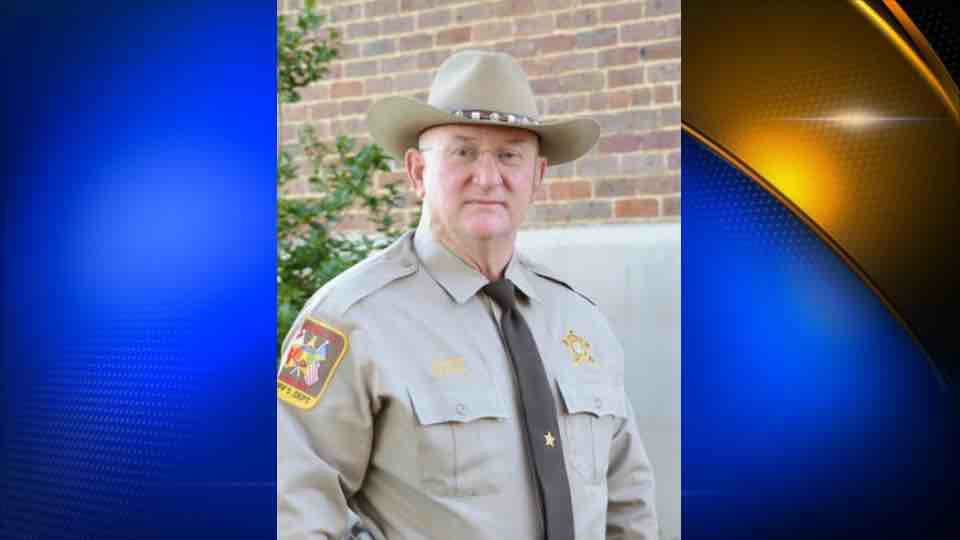
A judge on Monday sentenced a former Alabama sheriff to 18 months in federal prison after he pleaded guilty to scamming a food bank and his own small-town church to obtain inexpensive jail food and boost his personal income. U.S. District Judge Liles Burke sentenced former Pickens County Sherriff David Abston to serve 18 months for wire fraud and filing a false tax return, federal prosecutors said in a news release. Abston was ordered to pay $51,000 in restitution. Abston was sheriff for over 30 years until the accusations derailed his lengthy law enforcement career. He resigned and pleaded guilty to one count of wire fraud and one count of filing a false tax return. Prosecutors said Abston in 2014 got the West Alabama Food Bank to agree to provide low-cost food to his own church, Highland Baptist of Gordo. The food bank agreed to provide food to help feed the poor, including poor children. Instead, much of the food went to the Pickens County Jail which Abston ran. The arrangement helped Abston boost his personal income, prosecutors said, because a state law at the time allowed sheriffs to pocket excess jail food funds. Legislators have since changed the law. “Abston tarnished his office and his badge,” U.S. Attorney Jay Town said in a statement. “He found out today he isn’t above the law. Those who believe they are will find themselves in federal prison.” Abston’s attorneys had asked for a sentence of home confinement and community service, citing his remorse and long history of public service. “While Sheriff Abston is deeply disappointed in today’s sentence, he has accepted responsibility for the wrong he committed and respects the court’s decision imposing consequences for his actions. He will serve his sentence, do what good he can during his period of incarceration, and then return to the community he loves to continue his life of community involvement,” Abston’s defense attorneys said in an emailed statement. Republished with the Permission of the Associated Press
U.S. Senate confirms Liles Burke to be North Alabama U.S. District Judge
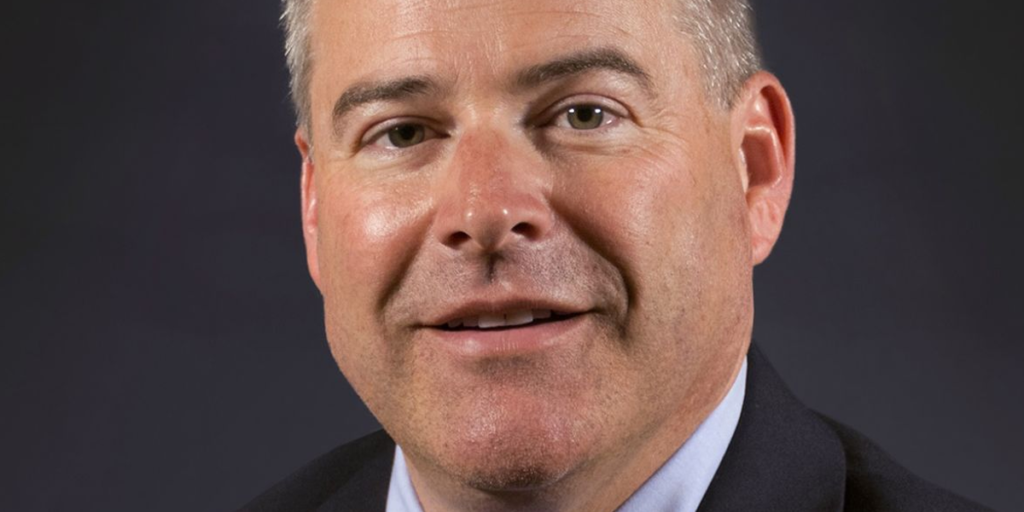
The U.S. Senate on Thursday confirmed an associate judge on the Alabama Court of Criminal Appeals to serve as U.S. District Judge for the Northern District of Alabama. U.S. Senator Richard Shelby made the announcement of Judge Liles Burke‘s confirmation. “I am proud to have voted tonight to confirm Judge Liles Burke to be a District Judge for the Northern District of Alabama,” said Shelby. “He is extremely qualified for this high honor, having served as a judge in Alabama for over a decade. I congratulate Judge Burke on this prestigious achievement and am confident he will serve our nation well.” Burke’s confirmation came as Senate leaders struck a deal to approve 15 federal, lifetime judges in exchange for recessing early through the Nov. 6 election. The Senate had previously been scheduled to be in session until Oct. 26, and the early recess will allow vulnerable Democrats to return to their home states and campaign for their seats. About Burke Burke, a native of Marshall County, was named the Municipal Judge for the City of Arab, Ala. in 2001. He held that office until 2006 when he was appointed Marshall County District Judge by former Governor Bob Riley. During his time as a trial judge, he created Marshall County’s first family drug court and started one of the state’s first domestic violence courts. In 2008 Burke was elected to a full term on the District Court, without opposition. During his years on the bench, he has served as President of the Alabama Appellate Judges Association and has been officer in both the Alabama District Judges Association and the Alabama Juvenile Judges Association. In February of 2011, Burke was named by former Governor Robert Bentley to the Alabama Court of Criminal Appeals, filling the office left vacant by the election of Judge Kelli Wise to the Alabama Supreme Court. He was elected to a six-year term in 2012 without opposition, and still serves there through his confirmation process. In addition to his experience in the courtroom, Judge Burke serves as the leader of the Marshall County United Way fund drive, City of Arab Chamber of Commerce, and the Arab Historical Preservation Committee. He is also a Rotarian and alumnus of Leadership Alabama, an officer in the Judge Advocate General’s Corps of the Alabama Army National Guard, and an assistant organist at First United Methodist Church of Arab. Burke received his B.A. from the University of Alabama and J.D. from the University of Alabama School of Law. Other judicial nominees Following Thursday’s vote, five Alabama judicial nominees, initially nominated by President Trump in 2017, have been confirmed. One 2018 nominee still awaits confirmation, and another awaits a hearing before the Judiciary Committee.
Annemarie Axon confirmed as U.S. District Judge

U.S. Sen. Richard Shelby released at statement on Wednesday celebrating the confirmation vote for U.S. District Judge for the Northern District of Alabama, Annemarie Carney Axon. Axon, who nominated for the position by President Donald Trump in 2017, appeared before the Senate Judiciary Committee for the consideration of her nomination this week. “It is critically important for a judge to be fair, open-minded, courteous, and respectful to the attorneys and parties in each case,” Axon told the committee; promising to “conduct [herself] and [her] courtroom in a manner that strives to leave people with the conviction that they were treated fairly, respectfully, and that [she] followed the law, regardless of the outcome.” She then ended her hearing with a statement, saying that “our democracy demands an independent judiciary whose decisions are based exclusively on the law, as it is written.” Shelby congratulated Axon in a news release, saying “Annemarie Axon is exceptionally qualified to be a U.S. district judge. Her strong, respectful temperament and commitment to impartiality make her well-suited for this esteemed position. Alabama’s district judges must be confirmed as swiftly as possible to ensure the efficiency of our judicial system. These judges serve as the backbone of the United States Judicial Branch, and I am honored to have played a part in Axon’s confirmation today.” Axon was one of seven Alabama judicial nominees awaiting confirmation from the Judiciary Committee. The other nominees include: Terry F. Moorer Jeffrey Beaverstock Emily Coody Marks Liles Burke Andrew Brasher Corey Maze Axon is currently a member of the Wallace, Jordan, Ratliff, & Brandt, LLC, legal team in Birmingham, where she focuses on fiduciary and probate litigation. Her legal career began in 2000 at the Edwards & Angell, LLP, firm in Rhode Island. She is still a member of both the Alabama and Rhode Island State Bar Associations. “We are extremely proud of Annemarie and congratulate her on her confirmation. Selfishly we hate to lose Annemarie as a valuable and integral member of our firm, but we know her temperament and sound judgment will make her a great federal judge,” said Jay Clark, managing member at Wallace Jordan. She also serves as the President of the YWCA Junior Board, a member of the Girls on the Run Board of Directors, and a member of the Mountain Brook City Schools Foundation Board.
Donald Trump nominates two Alabama district court judges
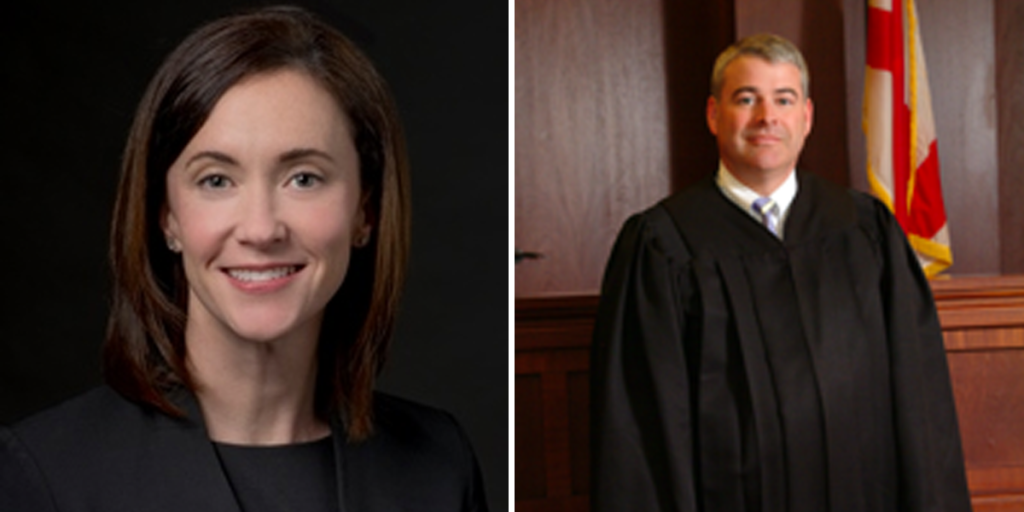
President Donald Trump announced 11 new federal district court nominations Thursday, including two in the Yellowhammer State, in an effort to fill more of the 100+ vacancies he inherited when he took office in January. Among the nominees is Annemarie Carney Axon an Alabama trust, estate and business attorney, to the U.S. District Court for the Northern District of Alabama. As well as Liles Burke, an associate judge on the Alabama Court of Criminal Appeals, to be a judge on the U.S. District Court for the Northern District of Alabama. Axon is a member of Wallace, Jordan, Ratliff, & Brandt, LLC, a Birmingham-based law firm where her practice is devoted entirely to litigation, with a concentration in fiduciary and probate litigation. In addition to fiduciary litigation, Annemarie’s experience includes litigation involving state and federal environmental laws, federal securities law, state immunity under 42 U.S.C. 1983, and general contract and tort law. After graduating law school, she clerked for Judge Inge P. Johnson for the same district court she’s been nominated to. She received her B.A. in History and Political Science from the University of Alabama and her J.D. from the University of Alabama School of Law. Burke, a native of Marshall County, was named the Municipal Judge for the City of Arab, Ala. in 2001. He held that office until 2006 when he was appointed Marshall County District Judge by former Governor Bob Riley. In 2008 Burke was elected to a full term on the District Court, without opposition. In February of 2011, Burke was named by former Governor Robert Bentley to the Alabama Court of Criminal Appeals, filling the office left vacant by the election of Judge Kelli Wise to the Alabama Supreme Court. He was elected to a six-year term in 2012 without opposition. Burke received his B.A. from the University of Alabama and J.D. from the University of Alabama School of Law. There are currently 107 vacancies in the federal district courts nationwide.


